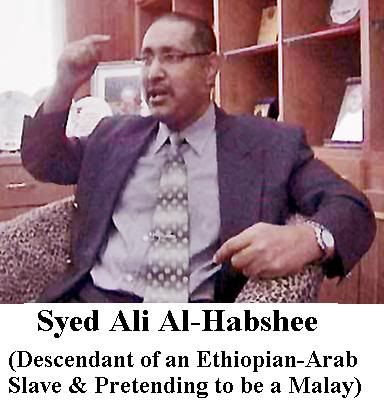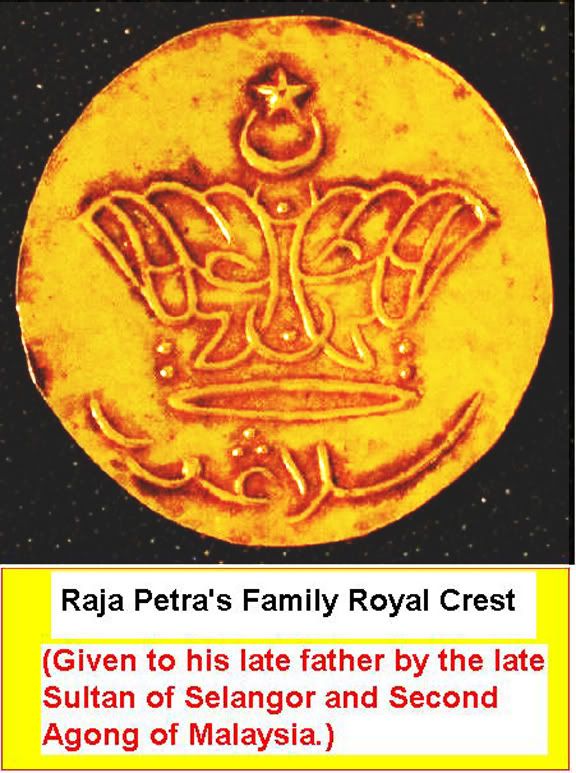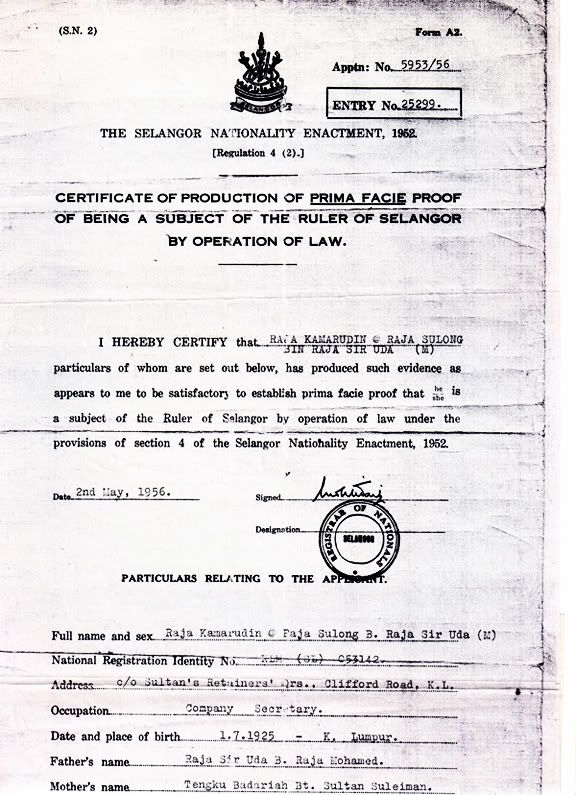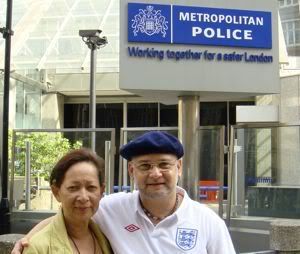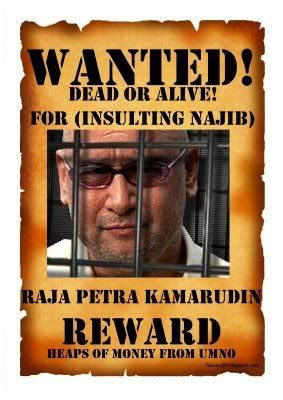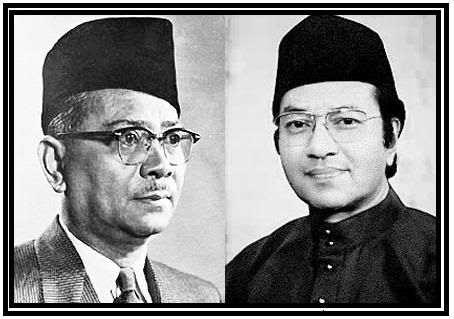THE MALAY RULERS' LOSS OF IMMUNITY
by
Professor Mark R. Gillen
Faculty of Law University of Victoria Victoria, British Columbia, Canada
(Occasional Paper #6 1994 )
Related Article:
Dr. Mahathir's Speech ( 13 February 1993) as PM in Parliament to Amend the Constitution to Strip the Malay Rulers' Immunity
THE MALAY RULERS' LOSS OF IMMUNITY
TABLE OF CONTENTS
I. Introduction
II. Historical Background on the Malay Rulers
A. The Malay Rulers Prior to the British Intervention
1. Origins and Structure of the M alay Sultanates
2. The Rulers and the Islamic Influence
B. The British Intervention
C. The Malayan Union Struggle
D. The Rulers Under the 1957 Constitution
E. The 13 May 1969 Riots
F. The 1983 Constitutional Crisis
III. Constitutional Amendments And The Events Leading Up to the Amendments
A. The Gomez Incident
B. Response to the Gomez Incident
C. The Proposed Amendments
D. UMNO's Justification for the Amendments and Opposition to the Amendments
E. The Rulers' Compromise
IV. Cultural Change and the Struggle for Power
A. The Struggle for Power
B. Cultural Change and Why the Government Acted When it Did
V. Conclusion
------------------------------------------------------------------
C. The Proposed Amendments
In response to the Gomez incident there were calls for steps to be taken to remove the Rulers' immunity.
Within weeks of the first reports of the Gomez incident amendments to the provisions of the constitution concerning the immunity of the Rulers were being drafted. Newspapers carried reports of support for the Government's strong stand on the Gomez incident and for proposals to amend the constitution to deal with the matter.
According to the reports, support came from both coalition government parties and from non-government coalition parties. Support was also reported from several groups and organizations in Malaysian society.
There were also reports and letters containing opinions to the effect that constraining the alleged abuse of the Rulers would be consistent with Islamic principles.
These proposed amendments dealt with the immunity of the Rulers, changes with respect to the Rulers' powers to grant pardons and changes with respect to sedition in the context of Parliamentary proceedings concerning the Rulers. The provisions of the Constitution providing for the immunity of the Rulers were to be amended to replace the general immunity with an immunity limited to their actions in an official capacity. The proposed amended version of Article 181(2) read,
No proceeding whatsoever shall be brought in any court against the Ruler of a State in respect only of anything done or omitted to be done by him in the exercise or purported exercise of his functions under any written law.
There was a similar proposed amendment of Art. 32 with respect to the immunity of the King.
A third clause to be added to Article 181 provided that any law which provided for the immunity of a Ruler of a State in his personal capacity or attached sanctity to his residence would be void.
Perhaps in the interests of garnering support from the Conference of Rulers, the proposed amendments provided that no proceedings could be taken against a Ruler in his personal capacity for anything done or omitted to be done by the Ruler before the amendments came into effect.
The whole notion of Rulers being subject to the criminal proceedings before a court and the consequences of criminal proceedings with respect to members of the royal families could be next to meaningless if the Rulers could pardon themselves or their family members. Consequently the provisions of the Constitution with respect to pardons were to be amended such that where a Ruler or his consort, son or daughter were involved the powers would not be exercised by the Ruler himself.
Where the King, or his Consort, or the Ruler of a state, or his Consort, were concerned the powers would be exercised by the Conference of Rulers and the King or Ruler concerned would not be members of the Conference of Rulers for that purpose.
Where the son or daughter of the King or Ruler of a State were concerned the power to pardon would be exercised by a Ruler of a State nominated by the Conference of Rulers who would act on the advice of a pardons board.
The proposed amendments also dealt with restrictions on questioning the privileges of the Rulers in either Parliament or State Legislatures. The proposed amendments provided that no person would be liable to any proceedings in any court against a person in respect of anything said by him of the King or a Ruler when taking part in proceedings of either house of Parliament or any committee thereof.
However, one exception to this remained. The person could still be liable if he or she advocated the abolition of the constitutional position of the King as the Supreme Head of the Federation or the constitutional position of the Ruler of a State.
Similarly, no person would be liable to any proceedings in any court in respect of anything said by that person of the Ruler of any State when taking part in any proceedings of the legislative assembly of a State or any committee thereof, unless the person advocated the abolition of the Ruler's position as the constitutional Ruler of the State.
Meetings of the Rulers with government representatives led to some last minute changes in the proposed amendments before they were presented in Parliament. The changes provided for the creation of a special court to deal with cases involving the Rulers.
If civil or criminal actions were brought against a Ruler or the King these would, under the revised version of the proposed amendments, be dealt with by a special court. The special court would consist of the Lord President of the Supreme Court, who would act as chair of the court, the Chief Justices of the High Courts, and two other persons, chosen by the Conference of Rulers, who are or were judges of the Supreme Court or High Courts.
The Rulers were said to have generally agreed to accept the proposed amendments on January 17, 1993.
However, at a special meeting on January 18 they issued a statement saying they were not in a position to give consent to certain proposals in the Bill without further deliberation and consultation. The Rulers, while acknowledging that "there can not be two systems of justice in the country" and that they agreed "to the formation of an effective mechanism to hear the [people's] grievances against them", expressed concern for the "far-reaching consequences on the sovereignty of the Malay Rulers".
They were of the view that a special court was not the most suitable forum for determining matters relating to the Rulers and proposed the creation of an Advisory Board to make recommendations to the appropriate State authority for the removal of a Ruler before he was charged or sued.
Nonetheless the proposed amendments, as revised, were tabled in the Dewan Rakyat (lower house) on January 18th, 1993 and were passed by both houses by January 20th.
D. UMNO's Justification for the Amendments and Opposition to the Amendments
UMNO's justification for the amendments was that they were necessary to protect the Rulers and preserve the institution of the Rulers as constitutional monarchs.
In response to claims that the amendments represented the first step towards the creation of a republic, UMNO pointed to the amendments on sedition which continued to make persons liable for statements in Parliament or a Legislative assembly advocating the abolition of the monarchy.
Otherwise amendments to the provisions on sedition were said to be necessary because although abuses by Rulers were known of in the past, little could be done because no one could voice criticisms of the Rulers even in Parliament or the State Legislatures and thus the public could not be made aware of the problems faced by the Government.
Semangat '46, an opposition party that was formed upon the breakup of the former UMNO party, opposed the amendments, taking arguably the strongest pro-royalty stance of any party. While it agreed that some steps needed to be taken so that the Rulers could "hear the grievances of the Rakyat (the people)",147 it claimed that the proposed amendments interfered with the sovereignty of the Rulers and were a step towards the formation of a republic. They argued that the ultimate removal of the Rulers would take away an important aspect of Malay culture and tradition and a symbol of Malay unity.
The Democratic Action Party (DAP), a primarily Chinese opposition party which is part of an opposition coalition with Semangat '46, originally supported the government in December when it expressed the need for action to be taken in light of the Gomez incident. It also initially supported the amendments.151 However, it abstained from voting when the amendments were introduced in Parliament in January. The reason they gave for the abstention was that the Constitution required the consent of the Rulers to amendments affecting their privileges and such consent had yet to be given.
According to DAP the consent was required before the amendments could be introduced in Parliament. DAP was accused of sacrificing its principles in favour of preserving their opposition coalition with Semangat '46.
The Islamic Party of Malaysia (PAS), a Malay pro-Islamic party and part of the opposition coalition, supported the government's call for action and the move to lift the Rulers' immunity in light of the Gomez incident155 but later abstained from voting on the amendments introduced in Parliament in January. Although it claimed to be in favour of the removal of the Rulers' immunity because it was not in accord with the principles of Islam, it said that the amendments were not "comprehensive enough" and that it did not like the manner in which the wrongdoings of the Rulers were exposed in the House.
PAS was arguably in a difficult position in that it may have wanted to avoid alienating the Kelantan royal family whose support could be influential in staying in power in the state of Kelantan.
E. The Rulers' Compromise
The decision of the Conference of Rulers not to consent to the proposed changes to the Constitution was followed by stepped up pressure on the Rulers. It was announced that henceforth the payment for the expenses of the Rulers would be limited to those that were expressly provided for by the law.
The government would no longer pay for the building and maintenance of rest houses, additional palaces, private wards in hospitals, yachts and aircraft.
The refusal of the Rulers to give their consent to the proposed amendments was followed by a barrage of media coverage exposing alleged excesses of the Rulers.
There were also further reports of influence by the Rulers in government affairs.
Eventually, on February 11, it was announced that a compromise had been reached and that the Rulers agreed to give their consent to the proposed amendments but with certain changes that were agreed to.
There were two changes to the amendments tabled in the House on January 18.
One was that a Ruler charged with an offence in the Special Court should cease to exercise his functions as a Ruler.166 Pending the decision of the Special Court a Regent would be appointed to exercise the functions of the Ruler. A Ruler convicted of an offence by the Special Court and sentenced to imprisonment for more than one day would cease to be the Ruler of the State unless he received a pardon. A similar provision was added with respect to the King.
The other change was that no action, civil or criminal, could be instituted against the King or a Ruler of a State with respect to anything done or omitted to be done in his personal capacity without the consent of the Attorney General. Overall the modifications appeared to be relatively minor. The revised amendments were submitted to Parliament and were passed by both Houses on March 9, 1993.
(Continue PART 6)
Related Articles:
